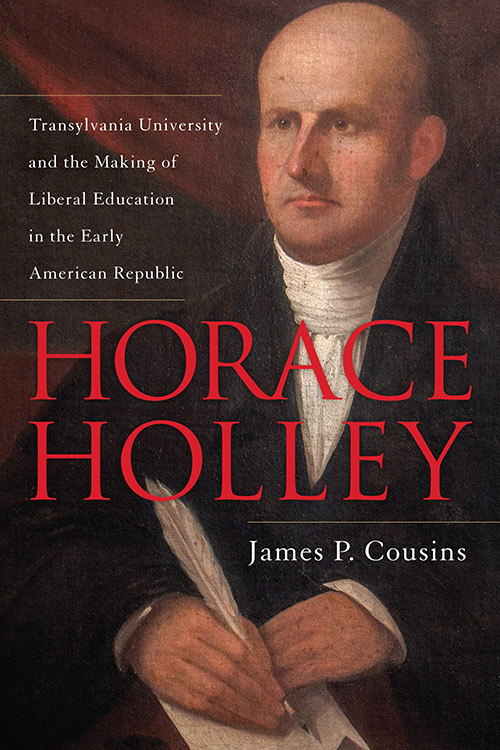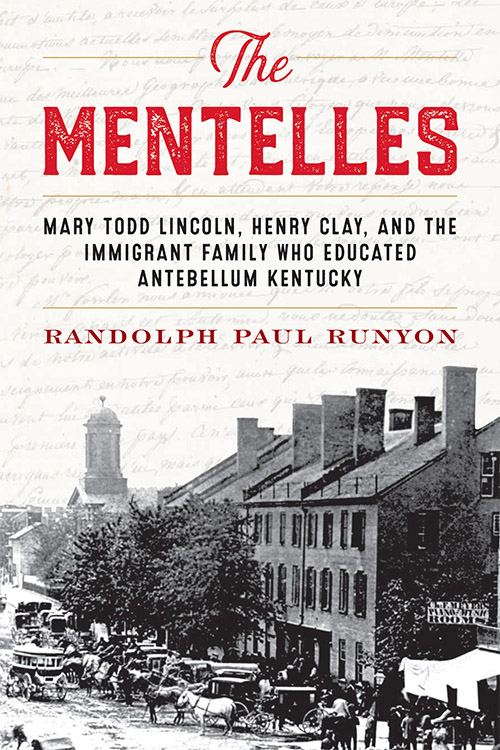Horace Holley
Transylvania University and the Making of Liberal Education in the Early American Republic
By James B. Cousin
University Press of Kentucky
297 pp., $50
Review by Katherine Dalton
Entire contents copyright © 2017 by Katherine Dalton. All rights reserved.
Horace Holley was not the first president of Kentucky’s Transylvania University, founded in 1780, but he is the one who put it on the map. A Unitarian minister raised in Connecticut and educated at Yale, who had been serving at Boston’s Hollis Street Church since 1809, he was hired by the trustees at Transylvania in 1818 to improve the college. He was successful in this, hiring new faculty (including Constantine Rafinesque, whom he later fired), establishing the medical and law schools there, and increasing the numbers of students.
He was a hard worker and a tireless letter-writer. He was well known and sought out by Thomas Jefferson and other eminent men, and for many years he had the support of Kentucky’s powerful senator Henry Clay, a Transylvania trustee. But Holley was also something of an on-the-make Yankee stereotype and an intellectual prig. He made a significant reversal in his religious opinions while still a young man, highly conscious of reaping some social and career benefits in so doing, but he never let his sermons be published, probably to forestall controversy, since he was not a Trinitarian Christian. And he was the sort of man who, on the death of his father, and after some flowery regrets, did not neglect to remind his brother that he, Horace, was expecting his share of the estate.
Holley was sociable to the point of pleasure loving, notorious for his flirtatiousness, which sparked some ugly (and unsubstantiated) gossip, and unable to live within his means, even when those means were generous. All of this was grist for his enemies. Transylvania had originally been founded with strong Presbyterian influence, and Holley never could rid himself of Presbyterian criticism, given the obvious and substantial theological differences—and 19th century public spats make our current political arguments look mild. Finally, after Holley met the very public opposition of Kentucky governor Joseph Desha, an enemy of Henry Clay, and the subsequent loss of public funds to support the university, he resigned from the school in 1827.
He died later that year en route back to Boston from New Orleans, where he had gone to establish a traveling academy and contracted yellow fever. He was buried at sea.
To write this book James Cousins (now a dean at Western Michigan University) doggedly tracked down as many Horace Holley letters, articles and pamphlets as he could—some of them hidden in “miscellaneous” files in collections under other men’s names. This book is a quilt of quotations from these papers, which give the reader a strong and not very admirable impression of the character of the man and his equally worldly wife, Mary. What this book lacks is any analysis of Holley, or even much in the way of context. Mr. Cousins never mentions, for example, that much of the Presbyterian hostility in Kentucky was likely due to their loss of influence at what had been their university, or why Holley lost the private esteem of his public supporter Henry Clay, or, most importantly, how a man with so many pretentions was in some ways so very successful. There is a great story here about the first university west of the Allegheny Mountains and its early eminence, about changes in what constituted an “educated man” in the early 19th century, and about the relationship of the Old West to the arrogance, energy, and clout of the Northeast. But that will require another book.
Katherine Dalton began working in journalism at The Yale Literary Magazine, during its brief period as a national magazine based at Yale. She has written for publications ranging from the Wall Street Journal and the Baltimore Sun to the University Bookman and Harper’s Bazaar. Ms. Dalton is a contributor to “Wendell Berry: Life and Work,” Morris Grubb’s volume “Conservations with Wendell Berry,” and the forthcoming Front Porch Republic “Manifesto.”





